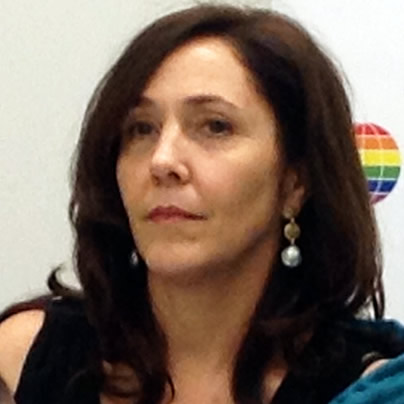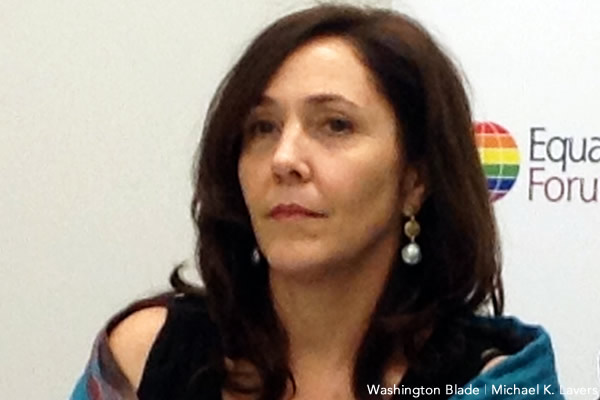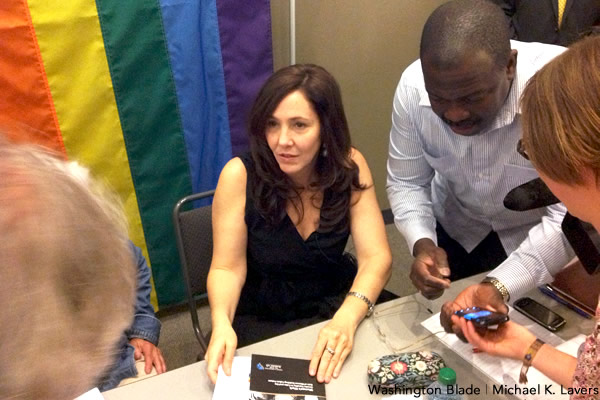National
LGBT rights group honors Mariela Castro
Ros-Lehtinen calls her ‘standard bearer’ for ‘oppressive’ regime


Mariela Castro spoke during a press conference in Philadelphia on May 4. (Washington Blade photo by Michael K. Lavers)
PHILADELPHIA – An advocacy group on Saturday honored Cuban President Raúl Castro’s daughter for her efforts in support of LGBT rights in Cuba.
“I’m very honored that this organization, Equality Forum, invited me to participate in this event this year,” Mariela Castro said during a press conference with the group’s executive director, Malcolm Lazin, at the National Museum of American Jewish History before she accepted her award.
“She is truly an international hero for LGBT equality,” Lazin added, noting there have been what he described as “remarkable changes for LGBT Cubans” because of Mariela Castro’s work as executive director of Cuba’s National Center for Sex Education (CENESEX.) “We are really very honored to have her here in the United States in an open forum.”
Mariela Castro has spearheaded a number of campaigns over the last decade to promote acceptance of LGBT Cubans and to curb the spread of HIV/AIDS on the island.
She successfully lobbied the Cuban government to begin offering free sex-reassignment surgery under the country’s national health care system in 2010.
Observers have credited Cuba’s condom distribution campaign and sexual education curriculum with producing one of the world’s lowest HIV infection rates. Cubans with the virus also have access to free anti-retroviral drugs through the country’s health care system.
Mariela Castro, whose uncle is former Cuban President Fidel Castro, in May 2012 appeared on a panel with Rea Carey, executive director of the National Gay and Lesbian Task Force, in New York while she and other Cuban scholars visited the United States. She also met with LGBT advocates in San Francisco during the trip.
CENESEX has also scheduled a series of events across the country between May 7-18 to commemorate the annual International Day Against Homophobia.
“I am very proud of how we have advanced [LGBT rights in Cuba,]” she said during a panel at the University of the Arts earlier on Saturday that former GLAAD President Jarrett Barrios moderated.
Sarah Stephens of the Center for Democracy in the Americas; Wilfredo Labiosa of the group Acceso and Philadelphia resident Ada Bella, who emigrated from Cuba to the United States in 1958 were the other panelists who joined Mariela Castro at the University of the Arts in Center City.
Mariela Castro, who has also spoken out in support of marriage rights for same-sex couples in Cuba, pointed out her mother, who directed CENESEX until she died in 2007, in the 1990s proposed an amendment to the country’s family code that would have defined marriage as a union between two people regardless of gender. She said during the panel that religious leaders and other Cubans questioned and even criticized her previous efforts to extend marriage and adoption rights to same-sex couples.
Mariela Castro added she plans to continue to fight for these issues once she returns to Cuba.
“We want everybody to have the same rights,” she said. “I think that same-sex couples should have the same rights.”
Some Cuban LGBT advocates remain critical of the government and Mariela Castro herself in spite of these efforts.
Leannes Imbert Acosta of the Cuban LGBT Platform claims authorities detained her last September as she left her Havana home to bring materials to CENESEX on a planned exhibit on forced labor camps known as Military Units to Aid Production – or UMAPs in Spanish — to which the government sent more than 25,000 gay men and others deemed unfit for military services during the 1960s. Ignacio Estrada Cepero, a gay man with HIV who founded the Cuban League Against AIDS in 2003, stressed during a New York City panel last year sponsored by Cuba Archive, a group that documents the Cuban government’s human rights abuses, that those with the virus on the island continue to face discrimination — including more than 500 people with HIV/AIDS he claims remain in prison for what he described as the crime of “pre-criminal social dangerousness.”
The Cuban government in 1979 repealed the country’s sodomy laws, but its critics continue to stress authorities use public decency and assembly laws to harass LGBT Cubans. Those with HIV/AIDS were forcibly quarantined in state-run sanitaria until 1993.
Fla. congresswoman blasts Mariela Castro
The State Department had initially denied Mariela Castro’s request to travel to Philadelphia, but Lazin on April 29 announced she had received the visa that allowed her to attend the event.
“Mariela Castro is the standard bearer for the oppressive Cuban dictatorship that has been wantonly violating people’s human rights for over 50 years,” Cuban-born Florida Congresswoman Ileana Ros-Lehtinen said in a statement she released on Friday. “To allow her to come to the U.S. yet again so she can proliferate the Castro propaganda machine is appalling.”
Herb Sosa, a first-generation Cuban American who is president of the Miami-based Unity Coalition, an LGBT advocacy group, also blasted Equality Forum’s decision to honor Mariela Castro.
“To reward any element of the decades-old dictatorship, especially for positive efforts on human rights — is a sad joke,” he told the Washington Blade. “The daughter and niece of the Castro dictators have blood on their hands. Her marches and public spectacles are nothing more than photo ops for a willing and enabling media that does not seem to want to ask too many questions.”
Lazin interrupted this reporter when he started to repeat his question to Mariela Castro’s interpreter about her reaction to those Cuban LGBT rights advocates and others on the island who have criticized both her and her father’s government.
“Let’s keep the questions to the award that Mariela is here for tonight, which is the International Ally for LGBT Equality,” Equality Forum Communications Director Chip Alfred told reporters during the press conference at the National Museum for American Jewish History. “She’s not here to talk about the politics in Cuba.”
Labiosa earlier in the day applauded Mariela Castro and the Cuban government for what he described as their efforts to advance the island’s LGBT rights movement.
“They have been able to move it to the new century,” he said as he compared it to those in the Dominican Republic, Puerto Rico and other Latin American countries and territories. “We as a country, as a movement can learn and should be able to be open to learn from the Cuban government and also from the CENESEX and from the people.”
U.S. Supreme Court
Supreme Court to consider bans on trans athletes in school sports
27 states have passed laws limiting participation in athletics programs

The U.S. Supreme Court on Thursday agreed to hear two cases involving transgender youth challenging bans prohibiting them from participating in school sports.
In Little v. Hecox, plaintiffs represented by the ACLU, Legal Voice, and the law firm Cooley are challenging Idaho’s 2020 ban, which requires sex testing to adjudicate questions of an athlete’s eligibility.
The 9th U.S. Circuit Court of Appeals described the process in a 2023 decision halting the policy’s enforcement pending an outcome in the litigation. The “sex dispute verification process, whereby any individual can ‘dispute’ the sex of any female student athlete in the state of Idaho,” the court wrote, would “require her to undergo intrusive medical procedures to verify her sex, including gynecological exams.”
In West Virginia v. B.P.J., Lambda Legal, the ACLU, the ACLU of West Virginia, and Cooley are representing a trans middle school student challenging the Mountain State’s 2021 ban on trans athletes.
The plaintiff was participating in cross country when the law was passed, taking puberty blockers that would have significantly reduced the chances that she could have a physiological advantage over cisgender peers.
“Like any other educational program, school athletic programs should be accessible for everyone regardless of their sex or transgender status,” said Joshua Block, senior counsel for the ACLU’s LGBTQ and HIV Project. “Trans kids play sports for the same reasons their peers do — to learn perseverance, dedication, teamwork, and to simply have fun with their friends,” Block said.
He added, “Categorically excluding kids from school sports just because they are transgender will only make our schools less safe and more hurtful places for all youth. We believe the lower courts were right to block these discriminatory laws, and we will continue to defend the freedom of all kids to play.”
“Our client just wants to play sports with her friends and peers,” said Lambda Legal Senior Counsel Tara Borelli. “Everyone understands the value of participating in team athletics, for fitness, leadership, socialization, and myriad other benefits.”
Borelli continued, “The U.S. Court of Appeals for the Fourth Circuit last April issued a thoughtful and thorough ruling allowing B.P.J. to continue participating in track events. That well-reasoned decision should stand the test of time, and we stand ready to defend it.”
Shortly after taking control of both legislative chambers, Republican members of Congress tried — unsuccessfully — to pass a national ban like those now enforced in 27 states since 2020.
Federal Government
UPenn erases Lia Thomas’s records as part of settlement with White House
University agreed to ban trans women from women’s sports teams

In a settlement with the Trump-Vance administration announced on Tuesday, the University of Pennsylvania will ban transgender athletes from competing and erase swimming records set by transgender former student Lia Thomas.
The U.S. Department of Education’s Office for Civil Rights found the university in violation of Title IX, the federal rights law barring sex based discrimination in educational institutions, by “permitting males to compete in women’s intercollegiate athletics and to occupy women-only intimate facilities.”
The statement issued by University of Pennsylvania President J. Larry Jameson highlighted how the law’s interpretation was changed substantially under President Donald Trump’s second term.
“The Department of Education OCR investigated the participation of one transgender athlete on the women’s swimming team three years ago, during the 2021-2022 swim season,” he wrote. “At that time, Penn was in compliance with NCAA eligibility rules and Title IX as then interpreted.”
Jameson continued, “Penn has always followed — and continues to follow — Title IX and the applicable policy of the NCAA regarding transgender athletes. NCAA eligibility rules changed in February 2025 with Executive Orders 14168 and 14201 and Penn will continue to adhere to these new rules.”
Writing that “we acknowledge that some student-athletes were disadvantaged by these rules” in place while Thomas was allowed to compete, the university president added, “We recognize this and will apologize to those who experienced a competitive disadvantage or experienced anxiety because of the policies in effect at the time.”
“Today’s resolution agreement with UPenn is yet another example of the Trump effect in action,” Education Secretary Linda McMahon said in a statement. “Thanks to the leadership of President Trump, UPenn has agreed both to apologize for its past Title IX violations and to ensure that women’s sports are protected at the university for future generations of female athletes.”
Under former President Joe Biden, the department’s Office of Civil Rights sought to protect against anti-LGBTQ discrimination in education, bringing investigations and enforcement actions in cases where school officials might, for example, require trans students to use restrooms and facilities consistent with their birth sex or fail to respond to peer harassment over their gender identity.
Much of the legal reasoning behind the Biden-Harris administration’s positions extended from the 2020 U.S. Supreme Court case Bostock v. Clayton County, which found that sex-based discrimination includes that which is based on sexual orientation or gender identity under Title VII rules covering employment practices.
The Trump-Vance administration last week put the state of California on notice that its trans athlete policies were, or once were, in violation of Title IX, which comes amid the ongoing battle with Maine over the same issue.
New York
Two teens shot steps from Stonewall Inn after NYC Pride parade
One of the victims remains in critical condition

On Sunday night, following the annual NYC Pride March, two girls were shot in Sheridan Square, feet away from the historic Stonewall Inn.
According to an NYPD report, the two girls, aged 16 and 17, were shot around 10:15 p.m. as Pride festivities began to wind down. The 16-year-old was struck in the head and, according to police sources, is said to be in critical condition, while the 17-year-old was said to be in stable condition.
The Washington Blade confirmed with the NYPD the details from the police reports and learned no arrests had been made as of noon Monday.
The shooting took place in the Greenwich Village neighborhood of Manhattan, mere feet away from the most famous gay bar in the city — if not the world — the Stonewall Inn. Earlier that day, hundreds of thousands of people marched down Christopher Street to celebrate 55 years of LGBTQ people standing up for their rights.
In June 1969, after police raided the Stonewall Inn, members of the LGBTQ community pushed back, sparking what became known as the Stonewall riots. Over the course of two days, LGBTQ New Yorkers protested the discriminatory policing of queer spaces across the city and mobilized to speak out — and throw bottles if need be — at officers attempting to suppress their existence.
The following year, LGBTQ people returned to the Stonewall Inn and marched through the same streets where queer New Yorkers had been arrested, marking the first “Gay Pride March” in history and declaring that LGBTQ people were not going anywhere.
New York State Assemblywoman Deborah Glick, whose district includes Greenwich Village, took to social media to comment on the shooting.
“After decades of peaceful Pride celebrations — this year gun fire and two people shot near the Stonewall Inn is a reminder that gun violence is everywhere,” the lesbian lawmaker said on X. “Guns are a problem despite the NRA BS.”
-

 U.S. Supreme Court3 days ago
U.S. Supreme Court3 days agoSupreme Court to consider bans on trans athletes in school sports
-

 Out & About3 days ago
Out & About3 days agoCelebrate the Fourth of July the gay way!
-

 Virginia3 days ago
Virginia3 days agoVa. court allows conversion therapy despite law banning it
-

 Maryland5 days ago
Maryland5 days agoLGBTQ suicide prevention hotline option is going away. Here’s where else to go in Md.













